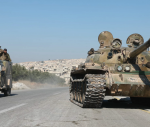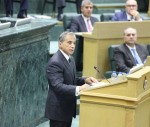You are here
Misguided policies and self-interest in Syria show no lessons learnt
Jun 08,2016 - Last updated at Jun 08,2016
Poised for weeks on the boundary between Hama and Raqqa provinces, Syrian army troops bolstered by the Homs-based pro-government Falcons of the Desert militia, finally entered Raqqa to do battle with Daesh.
Given air cover from Russian warplanes, the ground forces advanced on the town of Tabqa and nearby strategic assets.
Damascus’ primary objective is, reportedly, Tabqa military airbase seized by Daesh in August 2014 after a protracted battle.
More than 500 fighters on both sides were said to have died in the battle and 160 captured Syrian army soldiers were executed by Daesh.
The base had been used by the military to hammer Daesh’s stronghold in Raqqa city, some 40 kilometres to the east of Tabqa.
A second objective appears to be the Tabqa Dam which controls the flow of the Euphrates River into southeastern Syria and northern Iraq.
The dam, 40 kilometres west of Raqqa city, has created Lake Assad, Syria’s largest body of water.
Daesh is known to have based at the dam some of its senior leaders and to be holding high-value prisoners in the belief that the Syrians, Russians and Americans would not bomb the massive barrier because breaches would flood the countryside.
Daesh followed the same practice at the Mosul dam, in Iraq, recently retaken by Baghdad’s forces.
Meanwhile, the US-backed Syrian Democratic Forces, dominated by the leftist Kurdish Protection Units (YPG), have been battling Daesh in the Aleppo provincial town of Manbij.
As opposing fighters seized villagers in the vicinity of Manbij, Daesh fighters were said to have fled with their families.
Located on the main supply route between Raqqa and the Turkish border, Manbij has major strategic importance. The fall of Manbij and Jarablus to the north on the border could cut the supply of arms, ammunition, food and fuel to Daesh in Raqqa, making its rule there untenable.
Russia has called on the US to coordinate and cooperate in the campaign against Daesh in Raqqa, but Washington, still harbouring Cold War attitudes, has publicly refused.
Instead, the US is pressing its mainly Kurdish allies to launch a go-it-alone assault on Daesh fighters in Raqqa city.
There is, however, at least some covert coordination in a joint operations room in Baghdad where the Iraqis and Syrians are coordinating with input from Russia and the US.
Regional analyst Juan Cole of the University of Michigan argues that Washington may want its Kurdish allies to take Raqqa so that the Syrian government would be “excluded from the province as the country heads into a post-conflict stage”.
If Cole is correct, Washington would be demonstrating once again that its policymakers have not learned the lesson of Iraq.
That sorry country has been wrecked by the US invasion and occupation. Iraq is now at the mercy of Shiite fundamentalist and extremist Sunni taqfiri (Daesh) warlords who are already fighting over territory and resources, creating chaos in the country that was once the solid core of the Mashreq (Eastern Arab world).
The Kurds are, however, rightly reluctant to take on the task of “liberating” a Sunni Arab city. Their tribal allies, who number 3,000, are too few to assume this role.
Syrian Kurdish leaders are also aware that once the war is over, their community will have to live with their Arab countrymen and women, although the Kurds have stirred controversy by calling for the creation of an autonomous Kurdish region in northern Syria.
Antagonising the majority Arab population by conducting the Raqqa offensive would make coexistence difficult, if not impossible, particularly if done at the instigation of the hated US.
Concern in Damascus and Moscow that the Kurds might be tempted to do Washington’s bidding seems to have prompted the drive into Raqqa province at a time it might have been more sensible to take on Daesh at Deir Ezzor, where a Syrian army garrison and some 200,000 civilians are trapped by Daesh.
If the US had agreed to cooperate with Russia, the wise strategy would have been for the Kurdish-led forces to focus on sealing the Turkish border while the Syrian army turfs Daesh out of Deir Ezzor.
Depriving Daesh of Deir Ezzor would reduce the taqfiri cult’s revenues from the theft and smuggling of Syrian oil and could close the Iraqi border to prevent Daesh from resupplying and reinforcing Raqqa.
But the politicians in Washington continue to cling to the hope that Syrian President Bashar Assad can be ousted by opposition forces and politicians who have no idea how to rule a country.
Like the Iraqi exiles who rode into Baghdad on the backs of US tanks in 2003, Syrian exiles combined with the confusion of competing militias could transform Syria from a going concern into a failed state.
Russian Foreign Minister Sergei Lavrov this week expressed its displeasure with the US policy, warning Washington that Russia would give active support to Syrian ground troops after insurgent assaults in and around Aleppo killed dozens.
Lavrov has repeatedly told Secretary of State John Kerry that US-supported groups had to disengage from Al Qaeda’s Jabhat Al Nusra, branded a “terrorist” organisation, or suffer bombardment and ground attack.
Lavrov said that these insurgent groups had ample time to separate from Al Nusra and Daesh, but they have not done so. Al Nusra and Daesh provide muscle, money and planning for operations.
Furthermore, most insurgent groups are fundamentalist and espouse the same ideology as Al Nusra and Daesh, siblings spawned by Al Qaeda.
Moscow is not prepared to wait any longer for the divorce.
It is deeply ironic that Washington should be supporting in Syria a loyal offshoot of Al Qaeda, the movement that shocked the US and the international community with the 2001 attacks on the World Trade Centre in New York and the Pentagon in Washington.













